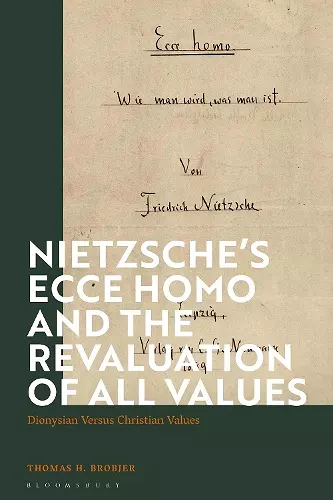Nietzsche’s 'Ecce Homo' and the Revaluation of All Values
Dionysian Versus Christian Values
Format:Hardback
Publisher:Bloomsbury Publishing PLC
Published:26th Aug '21
Currently unavailable, our supplier has not provided us a restock date

Re-interpretation of Nietzsche's last work, Ecce Homo, exploring its under-acknowledged philosophical purpose and its connection to Nietzsche's unfinished work on the revaluation of all values.
Challenging the standard interpretation of Nietzsche’s last published work, Ecce Homo, as frivolous autobiography, Thomas H. Brobjer provides an original and detailed analysis of Ecce Homo as fundamental to Nietzsche’s unfinished masterwork on the revaluation of all values.
Arguing that Ecce Homo laid the foundations for his planned four-volume work on values, Brobjer draws together the intentions and motivations behind Nietzsche’s late work to create a new narrative on it. He situates this period in the desire to undermine the system of Christian values that Nietzsche believed were unchecked as the standard moral gauge for his time. To engage in this project, Brobjer shows that it was essential for Nietzsche to explore the self and life-denying qualities of a Christian system of values within a broader framework of ideas about morality, altruism, egotism, pessimism, humility and pride.
By fully outlining the context of Ecce Homo, Brobjer provides a complete corrective to its reception as a self-referential and eccentric text of little philosophical significance, enabling a new understanding within the history of philosophy and Nietzsche’s oeuvre.
Thomas Brobjer’s book on Ecce homo presents Nietzsche’s autogenealogy in a provocative new way. It is a challenge particularly for Anglophone Nietzsche scholars engaged in rather scholastic debates. The study demonstrates how Ecce homo is intended to prepare Nietzsche’s late main project of a “transvaluation of all values” (“Umwerthung aller Werthe”) and how this project has to be reconsidered. * Andreas Urs Sommer, Professor of Philosophy and Executive Director of the Nietzsche Research Center, University of Freiburg, Germany *
Brobjer avoids dichotomising between Ecce Homo as autobiography and as a philosophical work, recognising the interconnection between Nietzsche’s life and philosophy. Employing thorough analysis of letters and drafts, Brobjer takes a distinctive approach to Ecce Homo as preparing a revaluation of values, while advancing important reflections on the symbol of Dionysius. * Katrina Mitcheson, Senior Lecturer in Philosophy, University of the West of England, UK *
This book.. heralds a great future for Nietzsche scholarship, for what it calls and awakens a hunger for is the revaluation of both the Nachlass and Nietzsche’s final two books. -- Charles P. Rodger * Journal of the History of Philosophy *
ISBN: 9781350193741
Dimensions: unknown
Weight: 472g
210 pages